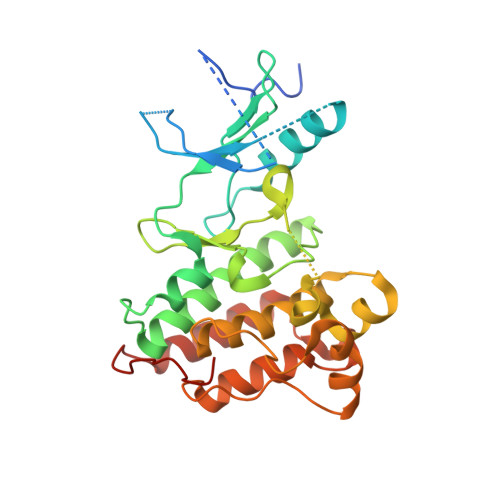Discovery and Pharmacokinetic and Pharmacological Properties of the Potent and Selective MET Kinase Inhibitor 1-{6-[6-(4-Fluorophenyl)-[1,2,4]triazolo[4,3-b]pyridazin-3-ylsulfanyl]benzothiazol-2-yl}-3-(2-morpholin-4-ylethyl)urea (SAR125844).
Ugolini, A., Kenigsberg, M., Rak, A., Vallee, F., Houtmann, J., Lowinski, M., Capdevila, C., Khider, J., Albert, E., Martinet, N., Nemecek, C., Grapinet, S., Bacque, E., Roesner, M., Delaisi, C., Calvet, L., Bonche, F., Semiond, D., Egile, C., Goulaouic, H., Schio, L.(2016) J Med Chem 59: 7066-7074
- PubMed: 27355974
- DOI: https://doi.org/10.1021/acs.jmedchem.6b00280
- Primary Citation of Related Structures:
5HLW, 5HNI, 5HO6, 5HOA, 5HOR - PubMed Abstract:
The HGF/MET pathway is frequently activated in a variety of cancer types. Several selective small molecule inhibitors of the MET kinase are currently in clinical evaluation, in particular for NSCLC, liver, and gastric cancer patients. We report herein the discovery of a series of triazolopyridazines that are selective inhibitors of wild-type (WT) MET kinase and several clinically relevant mutants. We provide insight into their mode of binding and report unprecedented crystal structures of the Y1230H variant. A multiparametric chemical optimization approach allowed the identification of compound 12 (SAR125844) as a development candidate. In this chemical series, absence of CYP3A4 inhibition was obtained at the expense of satisfactory oral absorption. Compound 12, a promising parenteral agent for the treatment of MET-dependent cancers, promoted sustained target engagement at tolerated doses in a human xenograft tumor model. Preclinical pharmacokinetics conducted in several species were predictive for the observed pharmacokinetic behavior of 12 in cancer patients.
Organizational Affiliation:
Sanofi-Aventis Germany GmbH , Industriepark Hoechst, 65926 Frankfurt am Main, Germany.















